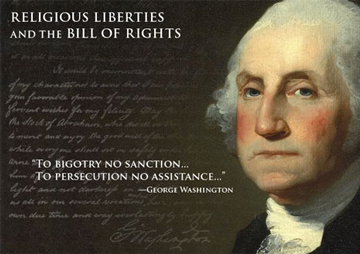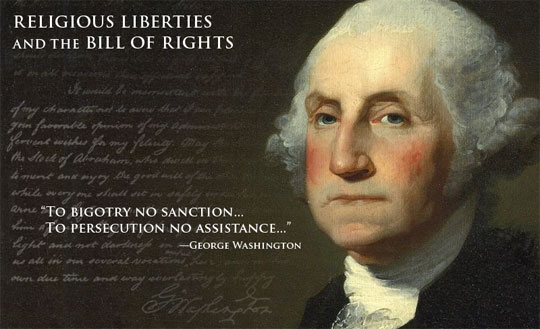Donald Trump vs. the Founding Fathers on Muslims Coming to U.S.
In his never-ending trolling of the American public, Donald Trump has now called for the banning of Muslim immigration into -- and even entrance into -- the United States.
This post originally ran on Truthdig contributor Juan Cole’s website.
In his never-ending trolling of the American public, Donald Trump has now come out and urged banning Muslim immigration into or even entrance into the United States.
Some of the below is revised from an earlier text
Forbidding people from entering the United States on the basis of their religion is inconsistent with the ideals of the Founding Generation of the United States of America, who explicitly mentioned Islam among the cases when they spoke of religious freedom:
‘George Washington asked in a March 24, 1784, letter to his aide Tench Tilghman that some craftsmen be hired for him: “If they are good workmen, they may be of Assia, [sic] Africa, or Europe. They may be Mahometans, [Muslims] Jews, or Christian of any Sect – or they may be Atheists …”
In his letter to the Jewish congregation of Newport, RI, Washington pledged that the “Children of Abraham” would not be made afraid in the United States (implicitly contrasting the new nation’s liberties and personal security with the pogroms of the Old World). It should be noted that Arab Muslims consider themselves, as well, descendants of Abraham through Ishmael:
” The reflection on the days of difficulty and danger which are past is rendered the more sweet from a consciousness that they are succeeded by days of uncommon prosperity and security.
If we have wisdom to make the best use of the advantages with which we are now favored, we cannot fail, under the just administration of a good government, to become a great and happy people.
The citizens of the United States of America have a right to applaud themselves for having given to mankind examples of an enlarged and liberal policy—-a policy worthy of imitation. All possess alike liberty of conscience and immunities of citizenship.
It is now no more that toleration is spoken of as if it were the indulgence of one class of people that another enjoyed the exercise of their inherent natural rights, for, happily, the Government of the United States, which gives to bigotry no sanction, to persecution no assistance, requires only that they who live under its protection should demean themselves as good citizens in giving it on all occasions their effectual support.
It would be inconsistent with the frankness of my character not to avow that I am pleased with your favorable opinion of my administration and fervent wishes for my felicity.
May the children of the stock of Abraham who dwell in this land continue to merit and enjoy the good will of the other inhabitants—- while every one shall sit in safety under his own vine and fig tree and there shall be none to make him afraid.”
Washington underlined that in the new social experiment that is the United States, toleration is not merely the indulgence of one group of people by a dominant elite. It is a right, which requires only that the individual be an upright citizen of the new country, which “gives to bigotry no sanction, to persecution no assistance.” Donald Trump is himself a bigot not good enough to pronounce George Washington’s name aloud, much less to succeed him in office.
Ben Franklin, the founding father of many important institutions in Philadelphia, a key diplomat and a framer of the US Constitution, wrote in his Autobiography concerning a non-denominational place of public preaching he helped found “so that even if the Mufti of Constantinople were to send a missionary to preach Mohammedanism to us, he would find a pulpit at his service.” Here is the whole quote:
‘And it being found inconvenient to assemble in the open air, subject to its inclemencies, the building of a house to meet in was no sooner propos’d, and persons appointed to receive contributions, but sufficient sums were soon receiv’d to procure the ground and erect the building, which was one hundred feet long and seventy broad, about the size of Westminster Hall; and the work was carried on with such spirit as to be finished in a much shorter time than could have been expected. Both house and ground were vested in trustees, expressly for the use of any preacher of any religious persuasion who might desire to say something to the people at Philadelphia; the design in building not being to accommodate any particular sect, but the inhabitants in general; so that even if the Mufti of Constantinople were to send a missionary to preach Mohammedanism to us, he would find a pulpit at his service. ‘
Not only did Ben Franklin not want to ban Muslims from coming to the United States, he wanted to invited them!
Thomas Jefferson wrote in his 1777 Draft of a Bill for Religious Freedom:
‘ that our civil rights have no dependance on our religious opinions, any more than our opinions in physics or geometry; that therefore the proscribing any citizen as unworthy the public confidence by laying upon him an incapacity of being called to offices of trust and emolument, unless he profess or renounce this or that religious opinion, is depriving him injuriously of those privileges and advantages to which, in common with his fellow citizens, he has a natural right . . . ‘
As I observed on another occasion, it was Jefferson’s more bigotted opponents in the Virginia legislature who brought up the specter of Muslims and atheists being elected to it in the world Jefferson was trying to create. He was undeterred by such considerations, which should tell us something.
British social philosopher John Locke was extremely influential on the Founding Generation, and on the US Constitution and Bill of Rights. John Locke had already advocated civil rights for non-Christians, including Muslims, in his Letter on Toleration:
‘ Thus if solemn assemblies, observations of festivals, public worship be permitted to any one sort of professors [believers], all these things ought to be permitted to the Presbyterians, Independents, Anabaptists, Arminians, Quakers, and others, with the same liberty. Nay, if we may openly speak the truth, and as becomes one man to another, neither Pagan nor Mahometan, nor Jew, ought to be excluded from the civil rights of the commonwealth because of his religion. The Gospel commands no such thing. ‘
Here is Jefferson again: “The most sacred of the duties of a government [is] to do equal and impartial justice to all its citizens.”
– Thomas Jefferson, note in Destutt de Tracy, “Political Economy,” 1816.
Or: “The legitimate powers of government extend to such acts only as are injurious to others. But it does me no injury for my neighbor to say there are twenty gods, or no god. It neither picks my pocket nor breaks my leg.”
– Thomas Jefferson, Notes on the State of Virginia, 1781-82
The US Senate, full of founding fathers, and the Adams government, approved the Treaty with Tripoli (now Libya) of 1797, which included this language:
“As the Government of the United States of America is not in any sense founded on the Christian religion; as it has in itself no character of enmity against the laws, religion, or tranquillity, of Musselmen; and as the said States never have entered into any war or act of hostility against any Mehomitan nation, it is declared by the parties that no pretext arising from religious opinions shall ever produce an interruption of the harmony existing between the two countries.”
The treaty is important for showing the mindset of the fashioners of the American system.
And here is a final point for Mr. Trump and his ilk to consider. The United States was born of a war against the British crown, the state religion of which was the Anglican Church. Those Anglicans who insisted on swearing allegiance to King George III were viewed as the enemy. And, the British custom of ‘establishing’ the Anglican church in many of the colonies, i.e. making it the state religion, was renounced by the revolutionaries. But there was no question that apolitical Anglicans could practice their religion freely, found Anglican (“Episcopalian”) churches anywhere they liked (even in places where the Americans and British had waged fierce battles, like New York), and even go to Britain to arrange for the training of Episcopalian/Anglican priests.
There is more. In 1787, Samuel Provoost was made the Episcopalian bishop of New York. He had been a Whig and a supporter of the Revolution even though an Anglican. In 1789, the US Senate made him its chaplain!
So not only did the Founding Generation not harbor a grudge against the religion of the British Crown (which had tried to crush them), they were perfectly willing to give non-Tory Anglicans high official positions in the new Republic. It would be as though the the current chaplain of the Senate were a former al-Qaeda member who had broken with Bin Laden and declared allegiance to the United States.
That is, the Founding Generation made a key distinction between religious practice and political loyalty, and had granted freedom of religion to non-Tory Anglicans.
Your support matters…Independent journalism is under threat and overshadowed by heavily funded mainstream media.
You can help level the playing field. Become a member.
Your tax-deductible contribution keeps us digging beneath the headlines to give you thought-provoking, investigative reporting and analysis that unearths what's really happening- without compromise.
Give today to support our courageous, independent journalists.







You need to be a supporter to comment.
There are currently no responses to this article.
Be the first to respond.